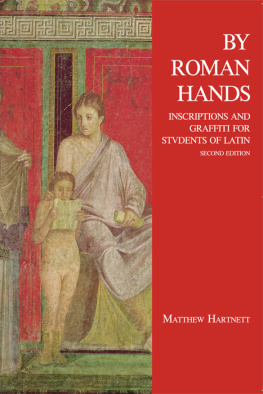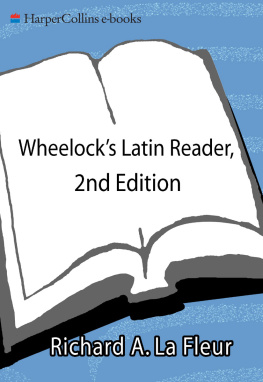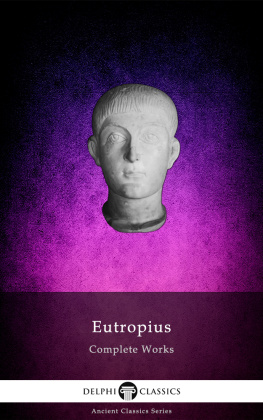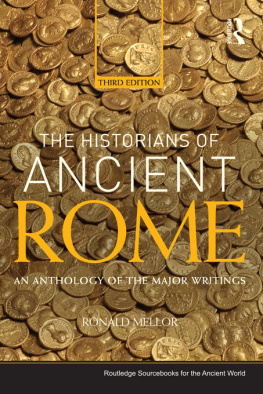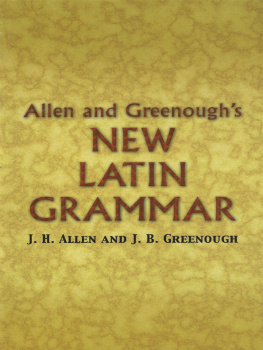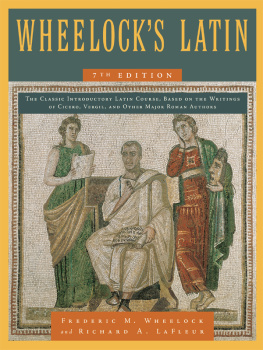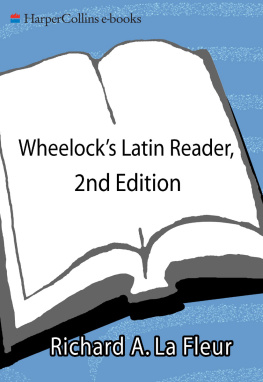LEGENDS OF EARLY ROME
LEGENDS OF EARLY ROME
Authentic Latin Prose for the Beginning Student
Brian Beyer

Copyright 2015 by Yale University.
All rights reserved.
This book may not be reproduced, in whole or in part, including illustrations, in any form (beyond that copying permitted by Sections 107 and 108 of the U.S. Copyright Law and except by reviewers for the public press), without written permission from the publishers.
Yale University Press books may be purchased in quantity for educational, business, or promotional use. For information, please e-mail (U.K. office).
Editor: Tim Shea
Publishing Assistant: Ashley E. Lago
Manuscript Editor: Juliana Froggatt
Production Editor: Ann-Marie Imbornoni
Production Controller: Katie Golden
Maps by Bill Nelson.
Set in Scala type by Integrated Publishing
Solutions.
Printed in the United States of America.
Library of Congress Control Number: 2015936438
ISBN: 978-0-300-16543-2 (pbk. : alk. paper)
A catalogue record for this book is available from the British Library.
This paper meets the requirements of ANSI/NISO Z39.48-1992 (Permanence of Paper).
10 9 8 7 6 5 4 3 2 1
It is the privilege of antiquity to mingle divine things with human, and so to add dignity to the beginnings of cities; and if any people ought to be allowed to consecrate their origins and refer them to a divine source, so great is the military glory of the Roman People that when they profess that their Father and the Father of their Founder was none other than Mars, the nations of the earth may well submit to this also with as good a grace as they submit to Romes dominion.
Livy, Ab urbe condita 1, preface
CONTENTS
PREFACE
Why Eutropius?
Since the publication of War with Hannibal in 2009 I have heard from students, teachers, and independent learners alike how helpful Eutropius has been in making the transition from a Latin textbook to reading real Latin literature. Even purportedly easy authors like Caesar and Nepos are in reality too difficult without adequate preparation. Eutropiuss vocabulary, style, and syntax provide an ideal foundation for reading authors such as these. He writes in good, standard classical Latin and uses nearly all of the most common and important grammatical constructions. His vocabulary, however, is quite simple, and his sentences are not overly long or complex. This gives students the opportunity to develop their skill and confidence in reading extended Latin prose, without getting lost in a morass of subordination or arcane vocabulary.
This new volume of Eutropius, then, is meant to contribute to the options available to those who wish to make a more seamless transition to Caesar or a similar author, while still using authentic Latin literature. It may be used on its own or in conjunction with War with Hannibal (the two volumes together include two complete books, approximately three thousand words, of Eutropiuss Breviarium ab urbe condita).
Book I of the Breviarium covers a period of Roman history that should have wide appeal to both high school and college instructors: from the founding of the city in 753 BCE to the sack of Rome by the Gauls in 390 BCE. Eutropiuss narrative is presented without any adaptations or omissions (except for the deletion of a single clause in the first sentence of chapter I and a short personal interjection addressed to the emperor Valens in chapter XII). Since the main source for Eutropiuss abbreviation of Roman history was an Epitome of Livy, generous passages in English from Livy supplement the Latin text, adding color and detail to Eutropiuss succinct account. Historical notesset off in boxes for easy referenceare provided in the Commentary, with special attention to questions of historicity.
As with War with Hannibal, it typically takes three to four weeks to read this text in its entirety at the college level. Thus it may be used as the payoff immediately after finishing an elementary textbook, or as an opportunity for review and reinforcement at the beginning of year two. At the high school level, either alone or in conjunction with War with Hannibal, the text provides an excellent foundation for the Caesar portions of the AP curriculum.
Format of This Edition
Since this text is meant to be a students first encounter with continuous Latin prose, the amount of translation help given is quite liberal. It comes in a number of forms: The most basic glossesthe ones most readers will need to get the Latinare beneath the text, where they are easily accessible. More in-depth translation help, formal analyses of the grammar and syntax, and historical notes are placed in the Commentary in the back of the book. This allows for an ample running commentary while leaving the simple glosses unencumbered.
The Commentary need not be read in its entirety but may be referred to on an as-needed basis. As such, basic translation help and identification of perfect participles, subjunctives, and the like are not phased out over the course of the notes. More lengthy discussions of grammar and syntax (e.g., regarding ablatives absolute and purpose clauses) take place only at the first occurrence of the element in question. Readers who would like to refer to these sections may easily do so by means of the Index of Selected Grammatical Constructions.
All grammatical principles in the Commentary are cross-referenced to Cambridge Latin Course: Unit 3, 4th Edition (New York: Cambridge University Press, 2002), Ecce Romani II, 4th Edition (Upper Saddle River, NJ: Prentice Hall, 2009), Jenneys Second Year Latin (Upper Saddle River, NJ: Prentice Hall, 1990), Latin: An Intensive Course (Berkeley: University of California Press, 1977), Latin for Americans, Level 2 (New York: Glencoe/McGraw-Hill, 2004), Latin for the New Millennium, Level 2 (Mundelein, IL: Bolchazy-Carducci, 2009), Learn to Read Latin (New Haven: Yale University Press, 2003), Oxford Latin Course, Part III, 2nd Edition (New York: Oxford University Press, 1997), Wheelocks Latin, 7th Edition, Revised (New York: Harper Collins, 2011), and Allen and Greenoughs New Latin Grammar (Boston: Ginn, 1903). This last is available online from the Perseus Digital Library at www.perseus.tufts.edu.
A section with only the bare Latin text has been included for use during classroom translation. Not having the notes under the students eye in the classroom ensures that the glosses are not used as a crutch and that grammatical concepts have been thoroughly learned. The inclusion of the bare text as a separate section allows the user-friendly bottom-of-the-page glosses to be preserved in the Text and Notes section for the students initial contact with the text.
The Appendices include maps of Rome and Latium in the fifth century BCE, and a bibliography lists those texts, commentaries, and translations of Eutropius most relevant to students. An Index of Selected Grammatical Constructions is included so that teachers may locate illustrative examples of particular constructions.
Vocabulary
The Vocabulary has been compiled specifically for Book I of Eutropiuss Breviarium. The entries have been adapted in part from Lewis and Shorts Latin Dictionary (New York: Harper and Brothers, 1897) and other standard lexica.
The Vocabulary also contains a number of features helpful to the beginning student: all forms whose dictionary entry might not be immediately recognized (e.g., irregular perfects, perfect participles) are given individual entries pointing to the relevant lexical form; the elements of all compound words are shown in brackets; basic biographical information is included for all historical persons; entries are given for all forms of personal names that appear in the text (e.g., praenomen abbreviations); specific passages in Book I of the
Next page



